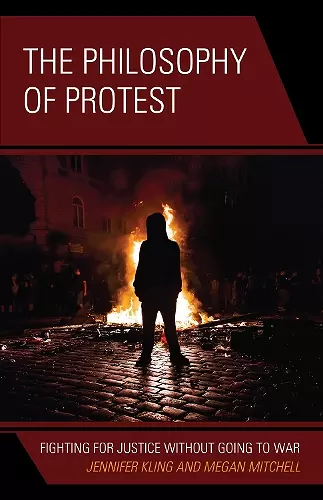The Philosophy of Protest
Fighting for Justice without Going to War
Jennifer Kling author Megan Mitchell author
Format:Paperback
Publisher:Bloomsbury Publishing PLC
Published:24th Oct '23
Currently unavailable, and unfortunately no date known when it will be back
This paperback is available in another edition too:
- Hardback£77.00(9781786613202)

Protest is a critical part of the contemporary political landscape. Despite the prevalence of protest as a real-world practice, most liberal political theory limits its focus on protest to ideal conditions. This book takes up the question of how to think about protest, from within the context of liberal political theory, in the face of serious, substantial, ongoing, and actual injustices—in short, a theory of protest for our world. What can or must protest include? What, if anything, must it avoid? Against much of the popular discourse, the authors defend the view that suitably constrained violent political protest is sometimes justified. Violent political protest is not simply revolution by any other name—it’s a last-ditch effort to remedy injustice without going to war.
It is often argued that political protest is legitimate only if it is non-violent, a view often attributed wrongly to Mahatma Gandhi, Martin Luther King, Jr., and/or Henry David Thoreau. When some of the Black Lives Matter protests turned violent, Kling and Mitchell, like many, found themselves wondering if this could be justified. Their book explores the ethical foundations of such wondering and concludes that political violence is sometimes justified and is not always inconsistent with the principles of liberal democracy. The argument against violent acts is that they forestall the possibility of resolving conflicts through communication. The authors counter that violence—they exclude lethal violence—may sometimes be needed to assert the right of an oppressed group to enter into such communication. They ground their argument in a comprehensive survey of contemporary ethical scholarship, particularly but not exclusively by scholars influenced by the work of John Rawls. They also seek a philosophical distinction between revolutionary and non-revolutionary protest, since most people would expect states to suppress violent revolutionary protest with force. The book is conversational in tone and would foster good discussion among undergraduate philosophy students. Recommended. General readers and advanced undergraduates through faculty. * Choice Reviews *
ISBN: 9781538188149
Dimensions: 214mm x 139mm x 14mm
Weight: 249g
182 pages